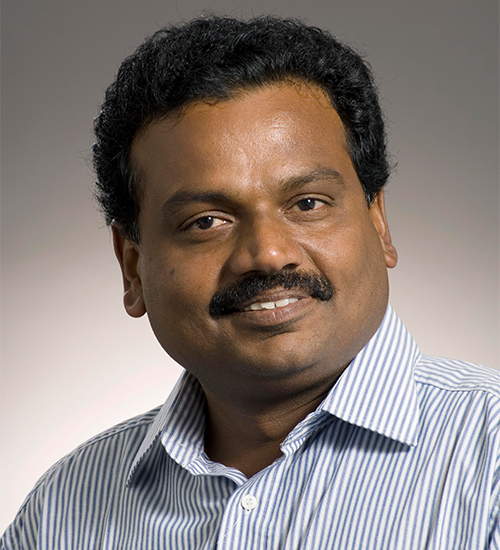Dr. Pratap Pullammanappallil
Associate Professor, Bioprocessing
With his background in chemical engineering, Pratap Pullammanappallil has focused his research and development efforts on waste management and biofuels. If it seems like these are two different things, they really aren't. It's a twenty-first century story as old as human culture -- how to take the waste from one process and generate new and useful products. Ancient, too, are the processes at the heart of his cutting edge work -- digestion and fermentation.
In Pullammanappallil's work on waste management, he studies a process called anaerobic digestion. "Anaerobic" simply means that the process takes place in the absence of oxygen, and digestion is the general word for breaking down and transforming materials into simpler chemicals. In this case, bacteria consume waste materials and produce "biogas," a mixture of carbon dioxide and mostly methane. The carbon dioxide is removed, and what remains is methane, the primary ingredient in natural gas. This biofuel can be used in any process that is set up for natural gas, from industrial-scale boilers to home hot water heaters and form power plants to automobile fuels. He utilizes a process developed at ABE by Professor David Chynoweth called SEBAC, which stands for SEquential Batch Anaerobic Composting, a patented process now used by several industries and communities as a means of recovering fuel from waste materials.
Currently, his largest partner in this effort is a manufacturer of sugar beets in Minnesota. In Florida, when people think of sugar, they naturally think about sugar cane, but nearly half of the sugar produced in the United States comes from sugar beets. In the northern Midwest, sugar beets are harvested, trimmed, and then pressed to produce a liquid from which sugar is extracted. Along the way, a great deal of waste material is generated in the form of the trimmings (called "tailings"), the pulp left after the pressing, and the waste liquid, which is left after the sugar has been extracted. All of these waste products can be digested using Pullammanappallil’s newer anaerobic digestion design to produce methane.
Methane recovered from sugar beet waste can be used to offset the large amounts of natural gas that are used to extract the sugar. The digester currently operating at the Minnesota plant can handle two tons of beet tailings a day, but that is a relatively small portion of the 60 tons of solid waste they generate daily. Pullammanappallil estimates that if all these wastes were digested, over 60% of the natural gas used to produce beet sugar could be replaced with recovered methane. In this energy-intensive industry, that is a huge savings. An added benefit of the process is an almost 90% reduction in the volume of solid waste.
Pullammanappallil also describes how SEBAC has been used by communities to process the municipal waste that is hauled in by garbage trucks every day. This waste often contains a large quantity of paper, which is primarily made of a natural material called lignocellulosics. This material is an ideal feedstock for anaerobic digestion because the cocktail of natural microbes that do the fermenting thrive on it, not only producing biogas but also a rich compost residue. Considering the amount of waste that communities generate, the potential is vast.

Contact Information
352-294-6719
Office:
203 Frazier Rogers Hall
Mailing Address:
P.O. Box 110570
Gainesville, FL 32611-0570
-
Teaching
- AOM 4521: Intro to Biofuels
- ABE4812: Engineering Unit Ops
- ABE 5442: Bioprocess Engineering
- ABE 5663: Environmental Biotechnology
- ABE 5707C: Agricultural Waste Management
-
Research and Extension
- Conversion of lingo-cellulosic biomass to ethanol.
- Biodiesel production
- Hydrogen from biomass
- Continuous high solids anaerobic digestion of biomass.
- Anaerobic wastewater treatment systems
- Struvite crystallization for recovery of nitrogen and phosphorus in wastewater
-
Education
- Ph.D. Chemical Engineering, University of Florida 1993
- M.S. Engineering Science, University of Mississippi 1988
- B.Tech. Chemical Engineering, Indian Institute of Technology 1984
-
Professional Experience
- 2011 - Present
Associate Professor, Agricultural and Biological Engineering Department, University of Florida - 2005 - 2011
Assistant Professor, Agricultural and Biological Engineering Department, University of Florida - 2000 - 2005
Director, Centre for Organic Waste Management, School of Environmental Science, Murdoch University, Perth, Australia - 1996 - 2000
Lecturer, Department of Chemical Engineering, The University of Queensland, Brisbane, Australia - 1993 - 1996
Research Fellow, Department of Chemical Engineering, The University of Queensland, Brisbane, Australia.
- 2011 - Present
- Publications
-
Awards and Honors
- Nominated for Vice Chancellor’s Excellence in Graduate Supervision Awards, Murdoch University
- Phi Kappa Phi
- Graduate Research Fellowship
